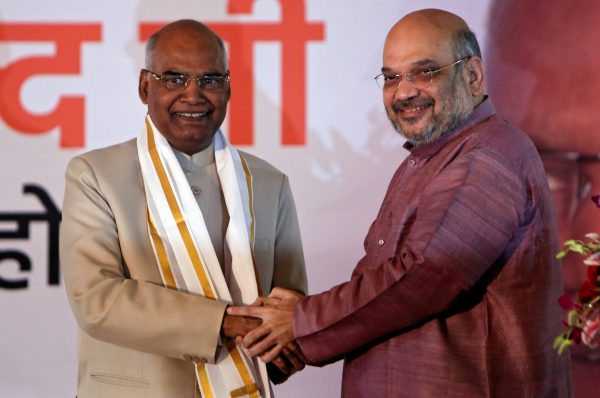Caste has always played a significant role in India’s politics. The latest pointer comes from the election of its 14th president: Ram Nath Kovind. He is a Dalit — a member of the oppressed classes who comprise over 200 million of India’s 1.3 billion citizens.
The caste factor was reinforced by the opposition parties, who felt compelled to field Meira Kumar, another Dalit and a former speaker of the Lok Sabha (the lower house). Kovind is the second Dalit to be the president after the late Kocheril Raman Narayanan. And before Kumar, another Dalit — Ganti Mohana Chandra Balayogi — had presided over the Lok Sabha.
Such political choices by India’s mainstream political parties are exercises in tokenism. Elevation of the oppressed into high offices and their election to legislatures where seats are reserved for them do not necessarily result in their social and economic elevation. Though their six decades of democratic evolution has given them some political identity and clout.
It is the political impact of this election that matters more. The campaign for vice president is underway and the outcome is foregone. The ruling BJP — riding high on a tidal wave of support since Prime Minister Narendra Modi led it to parliamentary victory in 2014 — is set to elect former president of the BJP Muppavarapu Venkaiah Naidu. Thanks to numbers the BJP-led National Democratic Alliance (NDA) commands, most likely to lose will be the joint opposition candidate Gopalakrishna Gandhi, who is a former administrator, erudite scholar, critic of the Modi government and grandson of Mahatma Gandhi.
The numbers are important. Kumar lost, receiving barely a third of the votes, and Naidu’s victory may be on similar lines.
When the presidential elections were announced, the electoral college tilted gently in the combined opposition’s favour by 20,000 votes since the latter has majority in the Rajya Sabha (the upper house). Yet Modi and BJP chief Amit Shah were able to win over (and even divide) many opposition groups. Kovind’s vote tally was 65.65 per cent — due in no small part to cross-voting in Kovind’s favour by over a hundred opposition legislators across the country. Eleven of them belong to Gujarat, which is Modi and Shah’s political backyard. So come mid-August, the BJP looks set to have for the first time all four top constitutional offices: president, prime minister, vice-president and speaker of the Lok Sabha.
All this should worry an opposition already in disarray, especially as Modi’s continues to enjoy a political ‘honeymoon’ in his fourth year in office. Many analysts find themselves echoing the triumphal calculations of the Modi–Shah team that the NDA will romp home in the 2019 parliamentary poll. Politically, the ‘there is no alternative’ factor is at work in India despite falling exports, low economic growth, poor job generation and turmoil over last November’s currency demonetisation.
In his farewell speech, former president Pranab Mukherjee, who entered office when the Congress was in power, yet again stressed the need for ‘tolerance’. Vice-President Hamid Ansari, whose term ends in mid-August, also subscribes to this view. Although Kovind in his first address also applauded the ‘pluralism’ and ‘diversity’ of Indian society, there are serious doubts whether Modi, his party and the numerous political/cultural affiliates subscribe to these values.
The plea for ‘tolerance’ emanates from frequent incidents of violence targeting Muslims and Dalits, often over accusations of beef consumption. Vigilantes have roamed the streets with impunity despite warnings from Modi and disclaimers from party leaders.
The issue of cow ‘protection’ is dear to the BJP, who espouse Hindu nationalism. Laws prohibiting cow slaughter passed during Congress rule, but were largely held in abeyance and even flouted as India emerged as the world’s largest beef exporter. They are now being strengthened and vigorously implemented.
Kovind is known for espousing the cause of the Dalits — one of the groups who fall victim to vigilantes over accusations of beef consumption. His election may help the BJP, which has long been considered a party of upper caste Hindus, to divide opposition parties for which the Dalits have traditionally voted. Similarly, the choice of Naidu — a Telugu-speaking South Indian — could help the ‘northern’ party spread south.
If Modi and the BJP can harness Kovind’s pluralism pleas, then the BJP may be able to further alienate the already crumbling opposition. If Congress and its allies do not soon regain ground, they may be resigned to stay under the heel of an increasingly powerful BJP.
Mahendra Ved is the President of the Commonwealth Journalists Association and a columnist at the New Straits Times.

